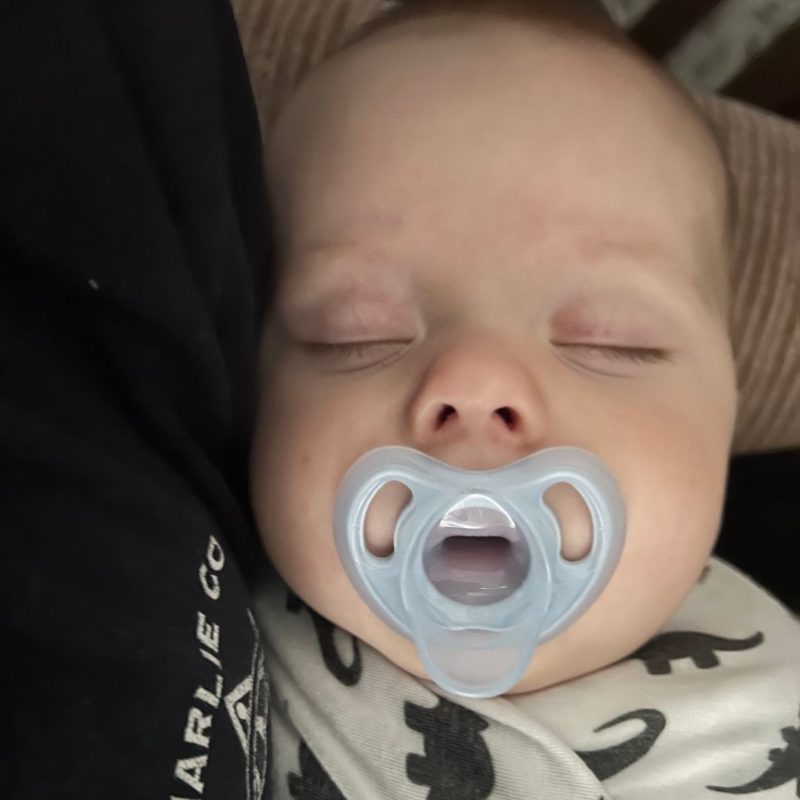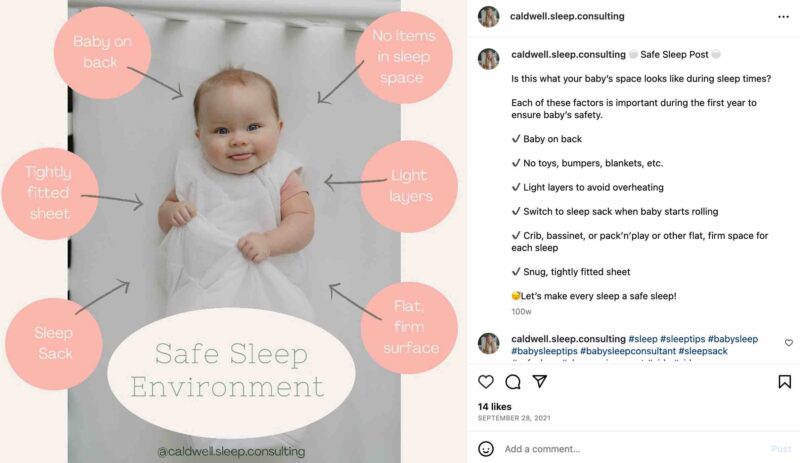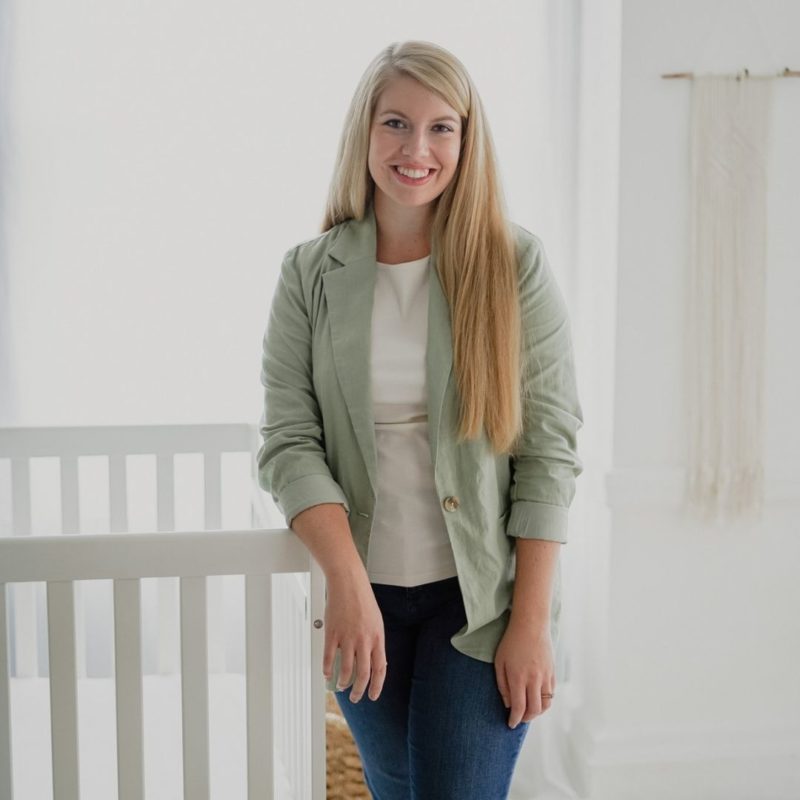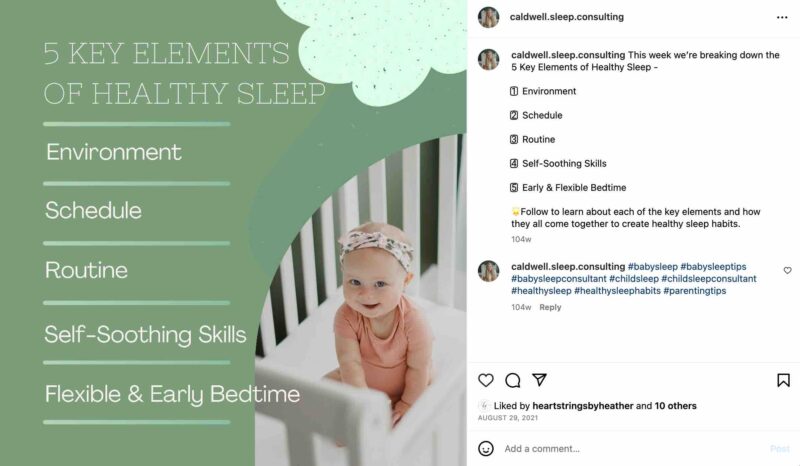Sweet Dreams: Navigating Sleep with a New Baby

If you know my son, Oliver, you know that he fights naps with everything he’s got. Over the course of our five months together I’ve had to get increasingly creative with ways to trick him into napping because he eventually learns my methods and fights it even harder! That’s why I decided to catch up with certified sleep consultant Jamie Caldwell of Caldwell Sleep Consulting to answer a few questions.
Here’s to getting more time dreaming and less time scheming!
Newborn Sleep
What does normal newborn sleep look like?
Newborn sleep is messy and disorganized. Day and night confusion is prevalent. Sleep periods can last 30 minutes – 4 hours and occur at seemingly random times. Newborn babies can typically only stay awake for 45-60 minutes. This is due to their immature circadian rhythms. It takes several months for babies to adapt to the 24 hour day cycle.
What’s the most important thing new parents should know about sleep with a newborn?
In those first few months with your baby, parents shouldn’t worry about creating “bad” habits or getting on a schedule. The most important thing a parent can do is safely promote as much sleep as possible. Focus on rest, bonding, feeding, and mom’s recovery.
I think it’s helpful for parents to know that a baby’s circadian rhythm doesn’t begin to develop until 3-4 months, with some babies developing closer to 5 months. This means physiologically a baby isn’t able to “get on a schedule” until this point. Many products on the market advertise a full night’s sleep and perfect naps at a much earlier point. While this can happen for certain families, parents shouldn’t feel any shame if it’s not happening for them. Expecting a baby to sleep through the night before they are capable is as unrealistic as expecting them to walk at 5 months. Their bodies simply aren’t ready yet.

Setting Up a Schedule
At what point can a baby be put on a schedule?
All babies are different. Bodies, temperaments, and sleep needs will vary child to child. That being said, the first sleep milestone occurs at 6-8 weeks. Night sleep is beginning to emerge and the baby can rest for stretches of ~4-6 hours. The next milestone hits around 12 weeks old when the baby can start to consolidate naps, rest even longer stretches through the night, and have a more predictable schedule. I emphasize start because it can still take weeks and sometimes months of practice from here for the baby’s sleep to come together.
What’s the most important aspect of a schedule?
Answer: (Everything! This was a tricky question and I could answer it 5 different ways. I think this answer is surprising though and truly makes a difference.)
Flexibility. I encourage parents to watch for their child’s cues (zoning out, tugging ears, puffy eyes, etc.) and promptly offer rest at the first sign of these cues. This means that one day your baby could take their first nap at 8:40 AM but the next day they need their morning nap at 8:20 AM. It may seem insignificant but studies have shown that as little as 15 minutes can make a difference in preventing an overtired child.
Why do some babies fight sleep and how can that baby be helped?
Great question! Many people assume if a baby is fussy and fighting sleep they’re a colicky baby. However colic only affects 20% of newborns. For our other 80% of babies, they could be fighting sleep for a few reasons.
- The Environment – Until babies hit their first sleep milestone at 6-8 weeks, they can virtually sleep anywhere – living rooms with talking family members, noisy restaurants, etc. As they hit their first milestone at 6-8 weeks, this changes. They become stimulated in social situations and now need a separate play and sleep space. At this milestone, I encourage parents to make sure their babies have a conducive sleep environment (cool, dark, quiet) to invite rest as easily as possible.
- The baby is overtired – It may be surprising but a chronically tired baby will see more night wakings, early morning wake ups, and shorter naps. When the body is tired it produces stress hormones to fight out the fatigue. These stress hormones make it very difficult for sleep to come together. For our younger babies I recommend offering as much safe sleep as possible. Don’t worry about “habits” at this point. For our older babies – tune into your babies cues and offer an early bedtime. An early bedtime is the quickest way to start paying back sleep debt.

How many hours should the different age ranges be getting?
Each child is different with varying needs. Rather than adding a chart with numbers and guidelines, I’d rather provide parents with these two tips. ***
If your baby seems tired – offer them rest. Following your baby’s individual needs rather than an online chart will be much more beneficial. If you watch them, tune into their cues, they’ll tell you exactly what their personal needs are.
See if your baby is getting enough sleep. Do this by watching your baby’s mood when they wake. Do they wake up happy? Are they able to make it to the next sleep window without breaking down? If they aren’t, it could be an indicator they aren’t getting enough restorative sleep.
***I made this point here because many newborn charts show a “sleep need” of 14-17 hours with approximately 3-5 naps. This is a HUGE range. I see parents on the lower end of these ranges worrying if their baby is getting enough. When asked by parents if their baby is getting “enough” sleep, I discuss these two topics with them.
A Note About Preventing SIDS
Think of it as “The ABCs” for a baby’s first year.
A – Alone. Place your baby in a sleep space by themselves. Removed toys, pillows, bumpers, etc.
B – Back. Every time you place your little one down, lay them on their backs. Even as the baby gets older and begins to roll – lay them on their back and allow the baby to choose their sleep position.
C – Crib. This is representative of a space with a firm, flat surface and tightly fitted sheet. It could be a crib, bassinet, or play yard.
I think a lot of parents are surprised to find out many items on the market aren’t actually designed for sleep. Most loungers, swings, rockers, etc are only designed to be used during supervised awake times.

A post shared by Jamie | Child Sleep Consultant (@caldwell.sleep.consulting)
Meet Jamie & Learn More About Sleep Consultant Services

Getting Started as a Sleep Consultant
I relocated to Huntsville from Indiana 3 years ago. I began nannying for a family with twins, just under a year old. The boys weren’t sleeping through the night and the parents were desperate for a solution. They hired a sleep consultant who completely changed their situation. I witnessed the peace and stability they received working with a sleep specialist and wanted to make the same impact for more families.
Her Mission
I believe it is my mission to shatter the untrue, over advertised idea that parents will never sleep again and some children are just “bad sleepers.” I’m here to give families the sleep they deserve.
Jamie’s Credentials
I received my bachelor’s in Human Development and Family Studies from Indiana University and my certification as a child sleep consultant from the Family Sleep Institute. I now run my own business – Caldwell Sleep Consulting, LLC.
Website | Facebook | Instagram
You May Also Like…
Lauren Lee is a longtime dog mom transitioning to life as a rookie human mom. She is married to her college sweetheart, Josh, and they welcomed their son, Oliver, to the world in June. Lauren is a Jacksonville State University alumni and has been a published writer since she was sixteen. In her free time, Lauren enjoys reading, writing, knitting and hiking with her two dogs.







